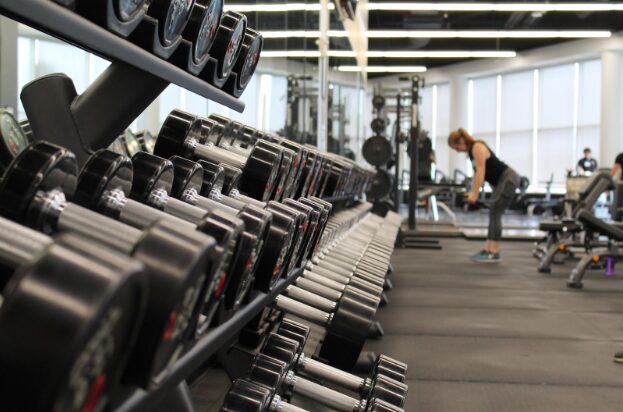Tooth extraction is a common procedure in the US, with over 5 million wisdom teeth removed every year! After the procedure, there are a few post-op precautions to take so that you heal perfectly and quickly.
From waiting to eat solid foods after tooth extraction to waiting to exercise after tooth extraction, you’ll want to know all the answers to things you should and shouldn’t do after your tooth extraction.
Patients always come in before a procedure with a boatload of important exercise questions such as:
- Can you work out after wisdom teeth removal?
- How long after having a tooth pulled can you run?
- When can I exercise after wisdom tooth extraction?
- How long should you wait to exercise after tooth extraction?
If these are the questions you have on your mind, this blog post is for you. We’ll answer every exercise-related question for your tooth extraction process!

Can I work out after wisdom teeth removal?
Yes, you can work out after wisdom teeth removal. Having a tooth pulled doesn’t mean you’re entirely banned from working out or exercising the way you want to. However, the real question is, “When can I start working out after wisdom teeth removal?”
Just like you have to take care and eat soft foods after tooth extraction, you have to wait till you exercise after tooth extraction.
How long should you wait to exercise after tooth extraction?
If you’re in a practice of staying physically active throughout the week, you might feel the itch to get back to your routine as soon as possible. However, the time you need to wait till you get back to exercising depends on various factors, such as:
Complexity of your procedure
A tooth pulled isn’t just a tooth pulled. Having a tooth extraction can feature complex as well as simple procedures. So naturally, the nature of your tooth extraction plays a role in how quickly you can go back to your active lifestyle.
For example, in some simple extractions where a fully erupted tooth is removed, the healing time is fairly short. On the other hand, if your tooth extraction becomes a surgical process, you’ll be waiting for a while to exercise.
Type of exercise you want to do
Obviously, exercise is a vague umbrella of a term that can mean a lot of things for different people. Some people call walking an exercise. Some consider ballet and skateboarding an exercise while others might think of the gym when they hear the word exercise.
Now when there’s such diversity, the healing period can look different. Here’s a quick breakdown of common types of exercises and your answer to, “When can I exercise after tooth extraction?”:
- Running or jogging: 2 days (we recommend indulging in this slowly),
- Weightlifting at the gym: 3–5 days,
- Yoga or Pilates: 24 hours at least,
- Swimming: 5–7 days,
- Dancing: 4 days at least.

Your own healing ability
The human body is fascinating in a way that everyone’s healing ability is different from one another. And so, your healing process determines how quickly you can return to your favorite sport.
There are a few factors that influence how quickly your body heals, including:
- Age,
- Overall health,
- Your immune system, and
- Underlying medical conditions (diabetes, or such).
And if you really want to put a countdown on your healing process and avoid infections, it’s a wise move to ask your dentist about it. They can give you a rough but accurate answer!
When can I lift weights after wisdom teeth removal?
For at least 4 days, you should avoid lifting any weights. Lifting weights can put pressure on your recovery site and cause bleeding. This in turn can reverse your recovery process.
Instead, please wait for at least a week before you begin lifting weights to be on the safe side.
FAQs
After tooth extraction, it is generally recommended to rest for at least 24–48 hours. During this initial period, strenuous activities should be avoided to minimize the risk of bleeding, swelling, and complications.
Gentle activities, like walking, are generally considered acceptable after the first day, but it’s crucial to listen to your body and avoid anything that causes discomfort.
Yes, it is generally okay to walk around after a tooth extraction. In fact, light physical activity such as walking can promote blood circulation and aid in the overall healing process. However, it is important to avoid strenuous activities for the first 24–48 hours to minimize the risk of bleeding and other complications.
Always listen to your body and consult with your dentist for personalized advice based on your specific situation.
Exercising one week after a tooth extraction depends on the individual’s healing progress. Generally, it’s advised to avoid vigorous activities during the first week to prevent complications such as bleeding or dislodging the blood clot.
Any exercise that involves sudden or rapid head or jaw movements should be avoided when you consider working out after wisdom teeth removal.
Yes, you can generally resume workouts two weeks after wisdom tooth extraction, but individual healing times may vary. If you still feel any discomfort during exercise after your 2-week period, please consult your dentist for further guidance!

Final Thoughts
While it’s natural to be eager to return to your regular exercise routine after wisdom teeth removal, it’s crucial to prioritize your recovery. Following the initial 24–48 hours of rest, consult with your oral healthcare professional for personalized advice on when and how to safely reintroduce exercise into your daily routine.
By taking a gradual and cautious approach, you can enjoy the benefits of exercise without compromising your recovery process! If you want to get the best dental care when it comes to tooth extractions or exercise after tooth extraction, book your appointment at Premiere Dental Clinics!


